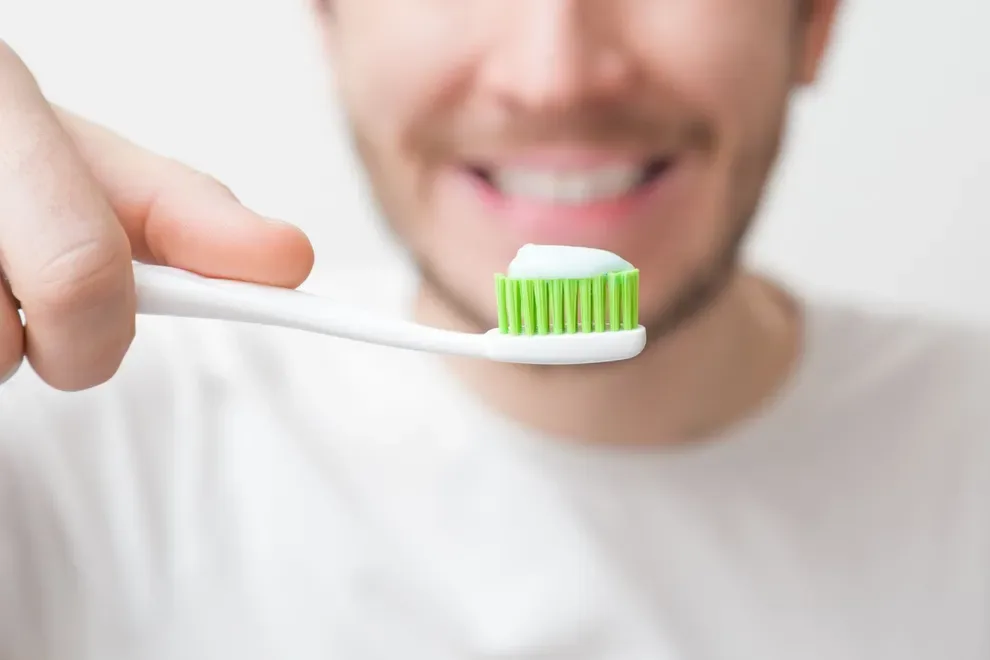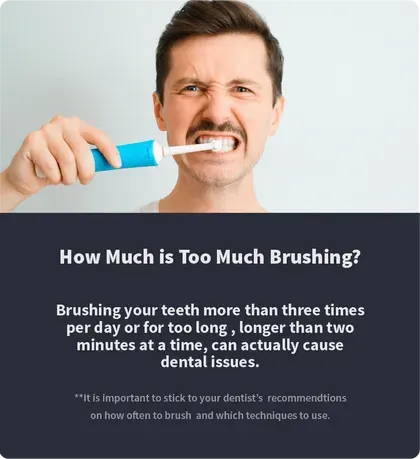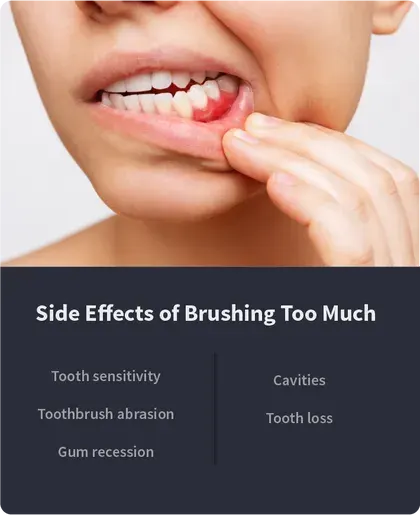Can You Brush Your Teeth Too Much? (How Often Is Too Much?)

Table of Contents
- Tooth Brushing Recommendations
- How Much is Too Much?
- Side Effects of Over-brushing
Between 10 and 20 percent of the American population have damaged their gums or teeth from overbrushing.
Good oral hygiene means brushing and flossing your teeth every day and sticking to routine visits with your dental professional. It is possible to overdo it, and brush your teeth too much.

Brushing your teeth more than two to four times per day, for longer than two minutes at a time, too vigorously, or with a toothbrush that is too firm can cause the enamel on your teeth to wear down too quickly. Overbrushing your teeth can also cause tooth sensitivity and recession of your gum line.
It is important to stick to your dentist’s recommendations on how often to brush and which techniques to use.
Recommendations for Teeth Brushing
The American Dental Association (ADA) recommends brushing your teeth two times per day for two minutes each time.
One of the ideal times to brush your teeth is first thing in the morning after waking up. At this time of day, bacteria has set in your mouth during the night, and it’s beneficial to remove it right away.
If you eat sticky, starchy, or sugary foods, it can be helpful to brush your teeth after. This can keep plaque from forming and hardening into tartar on your teeth. Brushing your teeth at night before bed can help to eliminate bacteria that has built up during the day.
Soft-bristled toothbrushes are considered the safest toothbrushes for your mouth, teeth, and gums.
They can remove plaque effectively.1 It is also possible to brush your teeth too hard, and using a soft-bristled toothbrush can help to prevent this.
Too Much Brushing
Most dentists will recommend brushing your teeth between two and three times per day, but not more than that. Brushing your teeth more than three times per day or for too long (longer than two minutes at a time) can actually cause dental issues. While you think you are practicing good oral hygiene, you may be creating further issues.
Talk to your dentist regarding how often, and for how long each time, you should brush your teeth. Your dentist can also demonstrate proper tooth brushing form and give you recommendations on a safe toothbrush and nonabrasive toothpaste.
Side Effects of Brushing Your Teeth Too Much

Brushing your teeth compulsively or vigorously (too much or too hard) can lead to the following issues:
Tooth sensitivity
Toothbrush abrasion
Gum recession
Cavities
Tooth loss
When you brush your teeth too hard and too often, you can wear down the enamel on your teeth. This can cause toothbrush abrasion.
Abrasion is when the tooth structure is compromised by an outside force, such as brushing your teeth.2 When the enamel gets worn down over time with repeated friction, the dentin underneath can be compromised, which can allow cavities to form and eventually lead to tooth loss.
Worn enamel from overbrushing your teeth can also cause the nerve endings in the dentin to be exposed, which can lead to tooth sensitivity. This can make it uncomfortable to eat or drink hot or cold items. It can also cause pain when brushing, flossing, or even touching your teeth.
Another potential side effect of brushing your teeth too much and too hard can be gum recession. Overbrushing is a common cause of receding gums.3
Gum recession happens when the gum tissue is damaged, and the gums start to pull away from your teeth. This exposes the roots of your teeth and opens them up for bacterial buildup and decay. If the gums continue to recede, your teeth can become loose or fall out.
